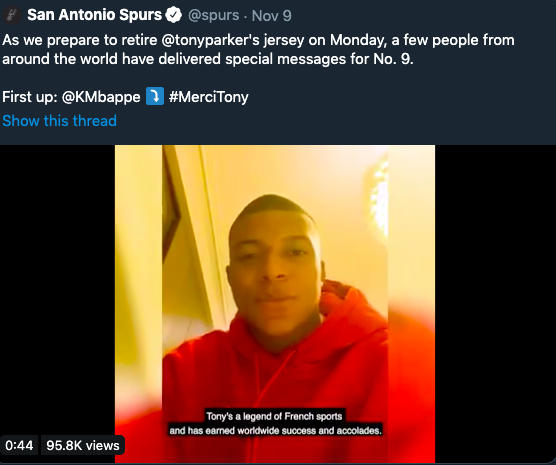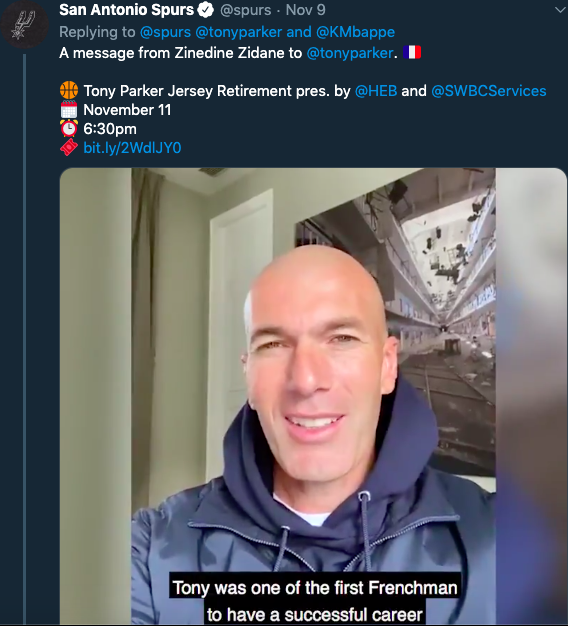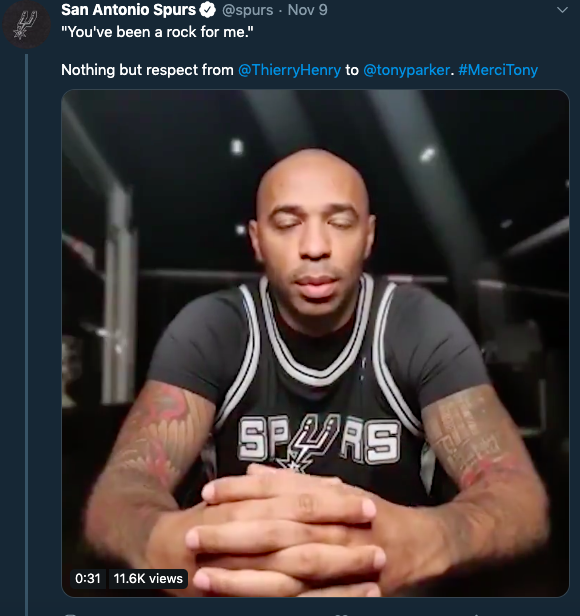#MerciTony
Happy Veteran’s Day, a day known elsewhere in the world as Armistice Day to acknowledge how on November 11, 1918, the guns of the Great War went silent as the cease-fire went into effect —and the war’s first commemoration was held the following year, 100 years ago today.
The First World War was a cataclysm. It was a watershed that propelled us into the modern, mechanized twentieth century. It was the consecration of the Franco-American relationship for, despite being #OldestAllies since 1776, the war was the first time that citizens of the sister republics came into close, daily contact with each other; the shared fight to defeat the Central Powers forged a new sense of amitié, especially between U.S. doughboys and the Third Republic soldiers and families who welcomed them on French soil.
The 1914-1918 experience was also the sanctification of basketball as a growing global game. While many countries, including France, played hoops before 1914, it was thanks to the mixing of men, women, and ideas that basketball took firmer root—particularly in France, where most of the U.S. Army was stationed. YMCA leisure foyers organized matches for soldiers behind the treacherous Western Front trenches while at hospitals, recuperating soldiers were encouraged to play as a good way to regain strength. The first international basketball tournament was held in June 1919 to solidify friendship and solidarity among allied powers; the Inter-Allied Games, played at Paris’ Pershing Stadium in the Bois de Vincennes, featured France, the United States, and Italy in its hoops competition.
It’s thus fitting that 100 years after the Franco-American and basketball bonds were more deeply entrenched that another milestone is being marked.
Today in Texas, the San Antonio Spurs are retiring jersey #9, the number worn by famed French point guard Tony Parker for all but one season in his storied NBA career.
It’s the cumulation of a weekend’s worth of fanfare and celebrations. San Antonio mayor Ron Nirenberg declared November 9 “Tony Parker Day,” a nod to the Frenchman’s signature number. Close friends and family, including the basketball family, flew in to lend support as the festivities round out today.
There’s a lot symbolism involved. Certainly, the Franco-American partnership was early-on embodied by a 19-year old Frenchman who arrived in North America with dreams of adventure and proving himself on his mind (Lafayette). Coincidentally, Parker was just 19-years old when he arrived in the United States also dreaming of adventure and proving himself—on court.
You’ll read a lot about how and why future Hall of Famer Parker was such a memorable part of the Spurs, his on-court prowess, and role within the NBA pantheon of notables. And maybe if you’re in France, you’ll read his recently released autobiography, Au-delà de tous mes rêves. But here’s your cheat-sheet for the larger TP impact back home—and why his jersey retirement is such a big deal:
1. American Mentality and Dreams. Parker inherited a competitor’s mental tenacity, vision to dream big, and belief in self to realize those dreams from his American father, Tony Parker Sr., a former professional player. Several first-hand witnesses to France’s hoops revitalization over the past 40 years credit this mind-set, imparted by generations of Americans who went to France to play professionally (notably, they say, Crawford Palmer), as a key ingredient to the rise of French basketballers (and basketballeuses). It was Parker, however, who began to infect the country’s key youth hoops academies—notably at INSEP (National Sports Institute), where he finished his academic and basketball studies—with this can-do confidence. And it was Parker who helped other players back home, notably close friends since INSEP days Boris Diaw and Ronny Turiaf, to also dream big, of playing in and winning NBA championships, and of realizing those aspirations.
2. French in the NBA is a Thing. Parker was not the first Frenchman to play in the NBA when he first suited up with the Spurs in 2001; that distinction goes to Abdul Tariq-Wahad with the Sacramento Kings in 1997. But Parker was the first Frenchman to impact the league, the first foreign-born and trained point guard to be named to the All-Rookie First Team with multiple accolades to come for the four-time NBA champion and NBA Finals MVP. Essentially, Parker proved that Frenchmen could play, somewhat dimming the image of Vince Carter dunking over French Knicks prospect Frédéric Weiss at the 2000 Sydney Olympics so deeply etched into American minds on the topic.
3. Helped Grow the Game Back Home. Parker’s success made subsequent generations of French players—boys and girls alike, such as NY Liberty’s Marine Johannès—dream of being like Tony and playing in the NBA/WNBA.
4. Investment in French Teams. Parker became an investor in the professional team in Lyon, ASVEL, in 2009 and over the years has grown his stake in the organization (he today serves as its president). In 2017 he brought in “little brother” Nicolas Batum and the two also invested in the city’s professional women’s team, ASVEL féminin. Given their recent partnership with Olympique Lyonnais’ Jean-Michel Aulas, expect interesting returns.
5. Inspired Athletes. The recent video tributes to Parker by other French greats, including close friend Thierry Henry, illustrates Parker’s outsized influence beyond basketball.
Merci, Tony, for what you’ve done. Enjoy your day.



